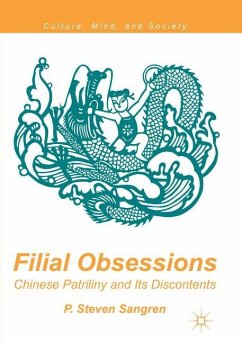
The World of the Japanese Mind
Conformity and Seken

PAYBACK Punkte
21 °P sammeln!
This book investigates the source from which the pressure to conform arises in Japanese society. Even though the contemporary Japanese word for "society" (Shakai) has a history of 140 years, it does not include the concept of respecting the individual but refers mainly to social frameworks and institutional aspects. At the same time, the traditional Japanese terms for "society", primarily Seken, that have been in use for 1,400 years have embraced human relationships of the members of the group.The hypothesis of this book is that there is no "society" as such in Japanese people's minds. By prop...
This book investigates the source from which the pressure to conform arises in Japanese society. Even though the contemporary Japanese word for "society" (Shakai) has a history of 140 years, it does not include the concept of respecting the individual but refers mainly to social frameworks and institutional aspects. At the same time, the traditional Japanese terms for "society", primarily Seken, that have been in use for 1,400 years have embraced human relationships of the members of the group.
The hypothesis of this book is that there is no "society" as such in Japanese people's minds. By proposing a new model (the Hand-Carved Tripod Model) of conformity in Japan, the book shows the structure of the pressure to conform. The tripod is composed of ambiguous words, the sense of belonging, and the "air", or understanding, that represents the unwritten rules and regulations of Seken.
Conformity in Japanese people's minds takesdifferent forms,from small residential groups to corporations at work, and to nationwide associations, but always dictates that people follow everyone else in the organization.
This book examines the sense of being blocked in Japan that has prevailed over 30 years, during the period of the so-called Three Lost Decades in Japan. Examining phenomena such as low worker engagement, karoshi (death by overwork), high middle-age male suicide rates, bullying in school and at work, sex discrimination, hereditary membership in the Diet, and failure to provide adequate protection for whistle-blowers, this book reveals a common structure in Japanese minds: lack of respect for individuality, and the traditional and narrow sense of the world, i.e., Seken.
This book will be beneficial to scholars and graduate students as well as to businesspeople who are interested in understanding the behavior and minds of Japanese people from the psychological,cultural, and historical viewpoints. It provides an integrated view of Japan's Seken as the platform that generates their conformity.
The hypothesis of this book is that there is no "society" as such in Japanese people's minds. By proposing a new model (the Hand-Carved Tripod Model) of conformity in Japan, the book shows the structure of the pressure to conform. The tripod is composed of ambiguous words, the sense of belonging, and the "air", or understanding, that represents the unwritten rules and regulations of Seken.
Conformity in Japanese people's minds takesdifferent forms,from small residential groups to corporations at work, and to nationwide associations, but always dictates that people follow everyone else in the organization.
This book examines the sense of being blocked in Japan that has prevailed over 30 years, during the period of the so-called Three Lost Decades in Japan. Examining phenomena such as low worker engagement, karoshi (death by overwork), high middle-age male suicide rates, bullying in school and at work, sex discrimination, hereditary membership in the Diet, and failure to provide adequate protection for whistle-blowers, this book reveals a common structure in Japanese minds: lack of respect for individuality, and the traditional and narrow sense of the world, i.e., Seken.
This book will be beneficial to scholars and graduate students as well as to businesspeople who are interested in understanding the behavior and minds of Japanese people from the psychological,cultural, and historical viewpoints. It provides an integrated view of Japan's Seken as the platform that generates their conformity.














